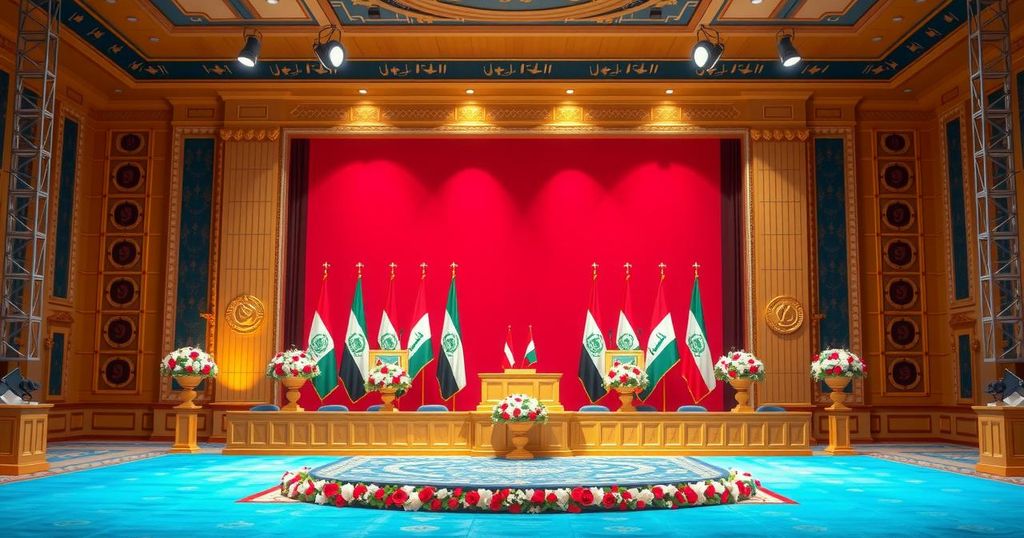Global news
ABU MOHAMMED AL - GOLANI, AHMAD AL - SHARAA, AL - QAIDA, AL - SHARAA, ARAB LEAGUE, ASIA, BAGHDAD, DIPLOMACY, FOREIGN MINISTRY, IRAN, IRAQ, MIDDLE EAST, MOHAMMED SHIA AL - SUDANI, MUSTAFA SAND, NORTH AMERICA, REGIONAL SECURITY, SYRIA, TEHRAN, TERRORISM, U. S, UNITED STATES
Fatima Khan
0 Comments
Political Divisions in Iraq Emerge Over Ahmad al-Sharaa’s Summit Invitation
The Iraqi government’s invitation to new Syrian President Ahmad al-Sharaa for the Arab League summit has prompted intense political divisions. While Shiite factions oppose his attendance due to his militant past, Sunni factions support engaging with his administration. This controversy highlights Iraq’s ongoing struggle with sectarian tensions and its role as a regional mediator.
Recent developments in Iraq have ignited significant political discord following the invitation extended to new Syrian President Ahmad al-Sharaa for the upcoming Arab League summit in Baghdad. Al-Sharaa ascended to power after a swift rebellion ousted his predecessor, Bashar Assad, in December. Although he seeks to foster unity and reconstruction after years of civil conflict, his history as a Sunni Islamist militant raises concerns, particularly among influential Shiite groups in Iraq.
Once known as Abu Mohammed al-Golani, al-Sharaa was involved with al-Qaida insurgents during the American-led invasion of Iraq in 2003. Presently, he faces an arrest warrant in Iraq for terrorism-related charges. Prime Minister Mohammed Shia Al-Sudani affirmed that Iraq officially invited al-Sharaa to the May 17 summit after an undisclosed meeting in Qatar, but al-Sharaa has yet to confirm his attendance.
Iraq aims to function as a mediator in the region, drawing on its robust connections with both the United States and Iran. This position was affirmed by Iraq’s previous facilitation of discussions that led to the restoration of relations between Iran and Saudi Arabia. A number of stakeholders, however, perceive the invitation to al-Sharaa as a chance to enhance Baghdad’s status as a center for regional diplomacy.
On the contrary, considerable resistance has emerged from Shiite factions allied with Iran, particularly since Tehran’s support for Assad during Syria’s civil war positioned them against al-Sharaa’s government. Many of these militias had previously supported Assad, rendering al-Sharaa a contentious figure. Mustafa Sand, an MP from the Coordination Framework, indicated that the foreign ministry inquired with Iraq’s Supreme Judicial Council regarding al-Sharaa’s warrant, receiving confirmation of its validity.
The Islamic Dawa Party, under former Prime Minister Nouri al-Maliki, urged the government to ensure attending summit participants do not have troubling judicial pasts. They stated, “The blood of Iraqis is not cheap,” implying that those with criminal records should not be included. The militia group Kataib Hezbollah also expressed their dissent, asserting that al-Sharaa’s participation was unnecessary for the summit’s success.
In contrast, Sunni political factions have expressed support for al-Sharaa, contending that his presence would enhance Iraq’s diplomatic relations with Syria. Former MP Dhafir Al-Ani suggested that obstructing al-Sharaa’s participation would undermine the Iraqi government and perpetuate violence.
The Iraqi government has not formally addressed the criticism. Although an arrest warrant could complicate al-Sharaa’s attendance, other nations have previously overlooked similar legal issues. The United States, for instance, chose not to pursue a $10 million reward for al-Sharaa’s capture after Assad’s ousting, though it has not officially recognized the new Syrian government.
In summary, the invitation extended to Ahmad al-Sharaa for the Arab League summit has unveiled deep-seated political rifts within Iraq, emphasizing the complexities of national reconciliation. While Shiite factions resist his attendance due to his controversial past, Sunni groups advocate for diplomatic engagement. This unfolding situation could either exacerbate sectarian divides or pave the way for innovative dialogue, underscoring the critical balancing act the Iraqi government must perform in its regional relationships.
Original Source: www.usnews.com




Post Comment